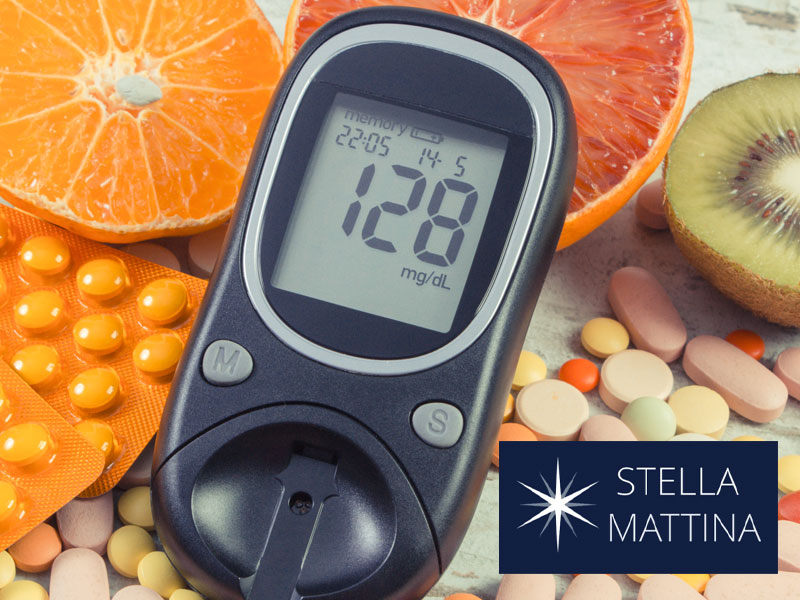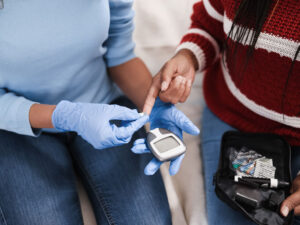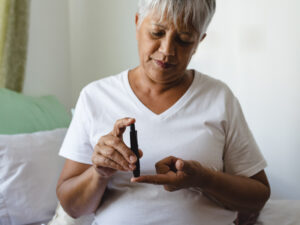
Navigating menopause brings many physical and emotional changes. And when combined with diabetes, this phase can add new layers to your challenges and the way you manage your health.
Menopause, the natural end of your reproductive years, often brings symptoms such as hot flashes, mood swings, and weight changes – all influenced by shifting hormones, like a drop in estrogen levels. Meanwhile, diabetes requires careful monitoring of blood glucose, diet, and lifestyle habits.
But could menopause trigger diabetes? And what happens to your body when you go through menopause while suffering from diabetes? What are the unique challenges in managing diabetes effectively during menopause? Or the other way around – how to manage menopause if you have diabetes?
In today’s article, we’ll explore how menopause and diabetes are interconnected, the role hormones play in blood sugar levels, and the adjustments you may need to make for effective diabetes management during menopause.
Read on to get some insights and tips to help navigate this dual journey with greater ease and understanding.
Table of contents
What is Diabetes?
Understanding Menopause
The Link Between Diabetes and Menopause
How Menopause Can Influence Diabetes Risk
Managing Your Overall Health
What is Diabetes?
Let’s begin by understanding diabetes.
Diabetes is a chronic condition that affects how your body regulates blood glucose, the primary energy source for cells. But what does that mean in practice?
If you have diabetes, your body either doesn’t produce enough insulin, the main hormone that helps glucose enter cells, or can’t use it effectively. This results in high blood sugar levels, which over time can lead to serious health complications, including, but not limited to:
- Heart disease
- Nerve damage
- Kidney issues
Diabetes comes in two main types: Type 1 and Type 2, each with distinct triggers, risk factors, and management approaches.
Type 1 Diabetes
Type 1 diabetes is an autoimmune disease in which your immune system mistakenly attacks and destroys the insulin-producing cells in the pancreas. Without insulin, glucose remains in your bloodstream, leading to high blood sugar levels.
This type of diabetes often occurs in children, teens, or young adults. For this reason, it’s sometimes referred to as “juvenile diabetes” because of its early onset.
If you have Type 1 diabetes, you need to rely on daily insulin injections or pumps to regulate your blood glucose, as your body cannot produce insulin on its own.
Type 2 Diabetes
In Type 2 diabetes, your body either doesn’t produce enough insulin or becomes resistant to it, making it less effective at lowering blood glucose levels. This condition is primarily influenced by lifestyle factors and genetics. Some risk factors include:
- Obesity
- A sedentary lifestyle
- Poor diet
- A family history of diabetes
Type 2 diabetes is more common in adults, particularly those over 45. However, with rising obesity rates, it’s now occurring more often in younger populations too, including children and teenagers.
Even though Type 2 diabetes individuals may also need medications or insulin injections to keep blood glucose levels in check, you can often manage the condition through lifestyle changes, including a balanced diet, regular physical activity, and weight loss.
Now, before we explore the link between diabetes and menopause, let’s understand this important milestone in a woman’s reproductive life.
Understanding Menopause
Menopause is a natural biological process marking the end of your reproductive years, with the permanent cessation of menstrual periods.
This transition is typically divided into three phases: perimenopause, menopause, and post-menopause. Each of them has its own distinct hormonal changes and symptoms that may have an effect on your body, mind, and overall health.
Perimenopause
Perimenopause usually begins in your 40s but can start as early as the mid-30s or as late as your 50s. This transitional phase may last from 4 to 8 years, ending when you have gone 12 consecutive months without a menstrual period.
Some perimenopause symptoms include the following:
- Irregular periods
- Mood swings
- Changes in menstrual flow, such as heavier or lighter periods
- Hot flashes
- Night Sweats
Some women may also experience sleep disturbances, breast tenderness, and increased PMS symptoms. All these symptoms are connected to hormonal fluctuation, particularly of estrogen and progesterone – which significantly drop when perimenopause starts.
Menopause
As mentioned, menopause itself only lasts officially one day. And it’s the day that marks 12 months since you had your last menstrual period. The average age of menopause is 51, but this may vary, with some women going through early or late menopause.
Some common menopause symptoms include:
- Hot flashes
- Night sweats
- Vaginal dryness
- Mood swings
- Difficulty concentrating
- Brain fog
- Changes in skin elasticity
- Weight gain
- Decrease in bone density
And here again, you can blame it on the hormones. The drop in estrogen and progesterone levels can take a toll on your overall health, triggering the menopause symptoms listed above.
These symptoms can last anywhere from a few months to several years. For most women, symptoms peak in the first two years following their last period and may gradually lessen over time. However, some symptoms, like hot flashes, can persist for up to a decade.
Post-Menopause
Post-menopause brings a higher risk of certain long-term health conditions. These include osteoporosis (due to reduced bone density), cardiovascular disease (as estrogen plays a protective role in the heart), and urinary tract issues.
For this reason, monitoring bone and cardiovascular health becomes essential during this phase.
With proper lifestyle adaptations and medical support, you may find ways to improve your comfort and health in this phase, focusing on preventive care, regular exercise, and a balanced diet to enhance long-term vitality.
Now, how to manage your health if you’re a menopausal woman with diabetes? How does menopause affect diabetes? Can hormones affect blood sugar? Does diabetes cause hot flashes?
Let’s try to answer some of these questions below, exploring the connections between diabetes and menopause.
The Link Between Diabetes and Menopause
Now that you’re aware of the changes in – and demands on – your body when you’re in menopause, or your specific needs if you have diabetes, let’s understand how these two conditions interconnect, and look at some tips on managing menopause if you’re a diabetic woman.
As seen, menopause brings significant hormonal changes, which may also have a profound impact on your blood sugar levels, making diabetes management more complex.
In addition, estrogen and progesterone – hormones that fluctuate and eventually decline during menopause – play a key role in insulin sensitivity. As these hormones decrease, blood sugar levels may become more difficult to control, often leading to increased insulin resistance and higher glucose levels.
So, although menopause doesn’t directly cause diabetes, it can increase the risk of developing type 2 diabetes, especially if you’re already at higher risk due to factors like family history, obesity, or a sedentary lifestyle.
Let’s look at how menopause can influence diabetes risk, and some key connections between both.
How Menopause Can Influence Diabetes Risk
Insulin Resistance
As estrogen levels drop, your body can become more resistant to insulin. This resistance may lead to higher blood sugar levels, which means women with Type 2 diabetes may need adjustments in their medications or lifestyle to maintain stable glucose levels.
Weight Gain
Many women experience weight gain during menopause, often due to hormonal changes and a slower metabolism. For those with diabetes, weight gain can worsen insulin resistance, further complicating blood sugar control and increasing the risk of heart disease.
Metabolic Shifts
Menopause is linked to changes in metabolism, including a slower metabolic rate and changes in how your body stores fat. These shifts can contribute to weight gain and elevated blood sugar, increasing the likelihood of developing diabetes.
Heart Health Risks
Both diabetes and menopause increase the risk of cardiovascular issues. Post-menopausal women with diabetes have an even higher risk of heart disease. So, it’s essential to monitor your blood pressure, cholesterol, and other cardiovascular health markers.
Sugar and Hot Flashes
While sugar itself doesn’t directly cause hot flashes, fluctuations in blood glucose levels can trigger or intensify them for several reasons, including a sudden drop in blood sugar levels (hypoglycemia) and inflammation.
This is why some women experience more intense hot flashes after consuming high-sugar foods. This causes a quick spike followed by low blood sugar levels.
Mood and Sleep Changes
Menopause-related mood swings, sleep disturbances, and hot flashes can have an impact on diabetes management by affecting energy levels and making it harder to stick to routines for diet, exercise, and medication. Poor sleep, in particular, is linked to increased insulin resistance and blood sugar spikes.
So, how to stop insulin resistance in menopause?
Let’s check it out now.
Menopause and Diabetes: Managing Your Overall Health
We know managing both menopause and diabetes can be challenging, as each condition affects the other. But don’t fret. With the right strategies in place, it’s possible to balance both and maintain your overall well-being.
Below, we gathered four key areas to consider for effective lifestyle management.
1. Supplements for Menopause and Diabetes
If you’re navigating diabetes and menopause together, certain medications and supplements can help stabilize blood sugar while also addressing menopause symptoms.
Your healthcare provider will be able to guide you and give you a tailored treatment plan. But here are some important nutrients and minerals to help you cope with the challenges:
Omega-3 Fatty Acids
Beneficial for heart health, omega-3 supplements may reduce inflammation and improve cardiovascular health, which is especially important for post-menopausal women with diabetes.
Calcium and Vitamin D
Essential for bone health, these supplements help counter the risk of osteoporosis, which is heightened in post-menopausal women.
Magnesium
This mineral can support better blood sugar control, reduce stress, and improve sleep quality, all of which are crucial during menopause.
2. Diabetes Medications
Diabetes medications are essential at times for blood sugar management, particularly as insulin resistance may increase during menopause. Common medications include:
Metformin
Often prescribed for Type 2 diabetes, metformin improves insulin responsiveness and helps lower blood sugar.
Insulin
Those with Type 1 diabetes need – or with advanced Type 2 diabetes may need – insulin injections, with adjustments in dosages during menopause, as blood sugar fluctuations can occur more frequently.
GLP-1 Agonists and SGLT2 Inhibitors
These newer medications for Type 2 diabetes help control blood sugar and may also support weight management, which can be challenging during menopause.
Don’t forget to closely monitor your health. Communicate regularly with your healthcare provider to ensure that your diabetes medications are appropriate during menopause.
3. Managing Menopause with Hormone Replacement Therapy
Hormone therapy (HT) can help alleviate many menopausal symptoms, but if you have diabetes, please weigh the risks and benefits with your doctor. Here are the most common types of hormone replacement therapy available for managing menopause symptoms:
Estrogen Therapy
As the name suggests, this kind of hormone therapy uses estrogen to restore the levels your body needs for relieving symptoms like hot flashes, night sweats, and vaginal dryness.
Combination Therapy (Estrogen and Progesterone)
If you have an intact uterus, your ObGyn may prescribe combined hormones estrogen and progesterone to reduce the risk of endometrial cancer. However, this therapy may also affect blood sugar levels, so careful monitoring is essential.
4. Lifestyle
Even more important than medications or supplements, a healthy lifestyle plays an essential role in improving your quality of life if you’re a menopausal diabetic woman. A healthy diet and exercise are foundational to managing symptoms. So, here’s what you should aim for:
Diet
Aim for a balanced diet rich in whole grains, lean proteins, healthy fats, and fiber to stabilize blood glucose. Limiting processed foods, sugars, and refined carbs can help avoid blood sugar spikes and crashes. Foods high in calcium and vitamin D, such as leafy greens, dairy, and fortified foods, are also important for bone health.
Exercise
Regular physical activity helps improve insulin sensitivity, supports weight management, and boosts mood. A combination of aerobic exercise and strength training is particularly effective for menopausal women. Weight-bearing exercises help strengthen bones, while cardio supports heart health and blood sugar control.
Stress Management
Techniques such as mindfulness, yoga, and deep breathing exercises can reduce stress hormones like cortisol, which can affect blood glucose. Practicing relaxation regularly can improve your emotional well-being, improve sleep quality, and ease menopausal symptoms.
Manage Diabetes and Menopause at Stella Mattina
Navigating menopausal symptoms and the challenges of diabetes can be complex, but with the right support, you can maintain a healthy, balanced life.
At Stella Mattina, our expert medical teams provide compassionate care tailored to your unique needs as a woman, helping you manage hormonal changes, blood sugar levels, and lifestyle adjustments effectively.
Take control of your health with Stella Mattina’s guidance. Schedule a consultation today and discover our comprehensive approach to menopause and diabetes care. Let’s talk.
Dr. Krum is currently in practice in Arlington, TX. He received his undergraduate degree at Texas A&M University, then attended UTMB Galveston for medical school, finishing in 1986, completing his residency there in 1990. Providing a full range of obstetrical and gynecological care, he specializes in the treatment of endometriosis and robotic surgery. He arranges his schedule so that same-day appointments are usually available.







